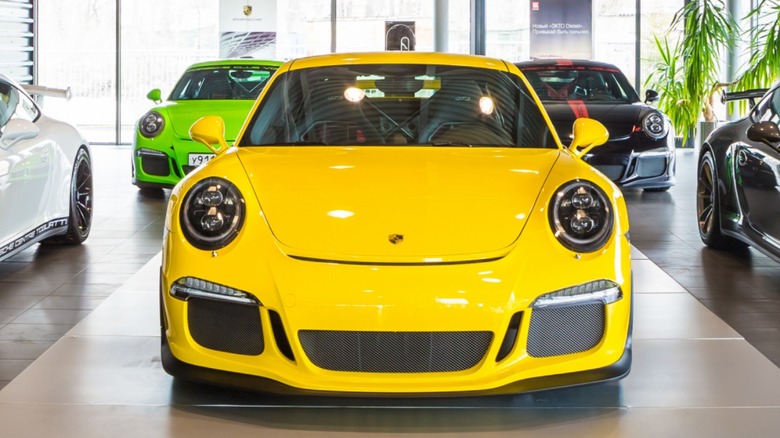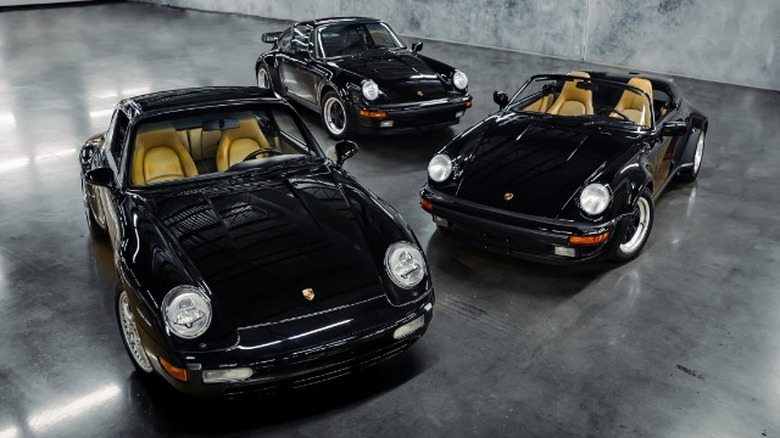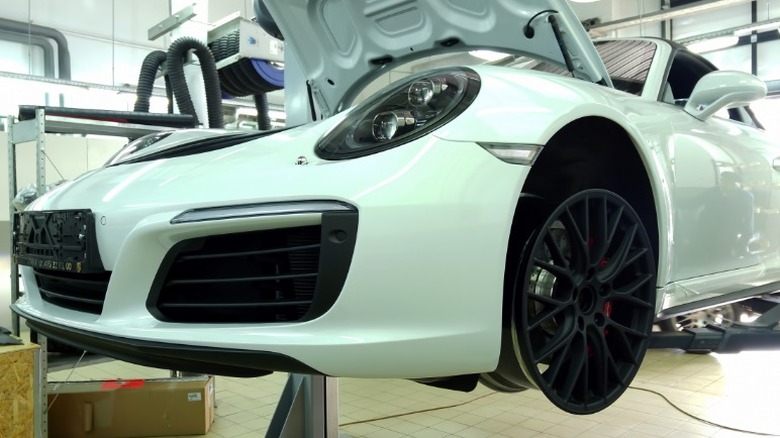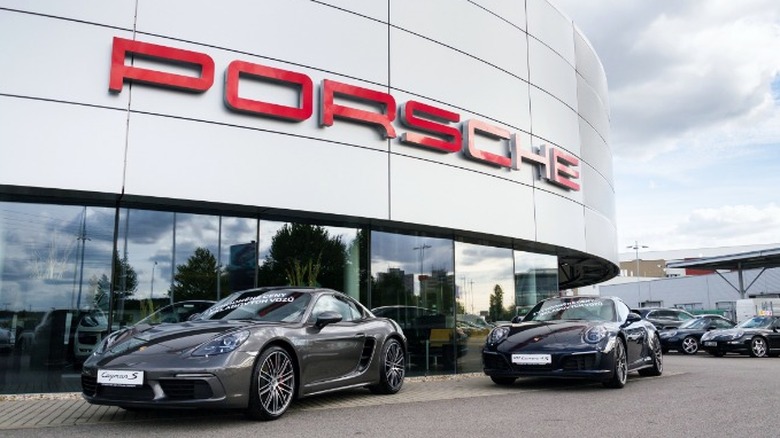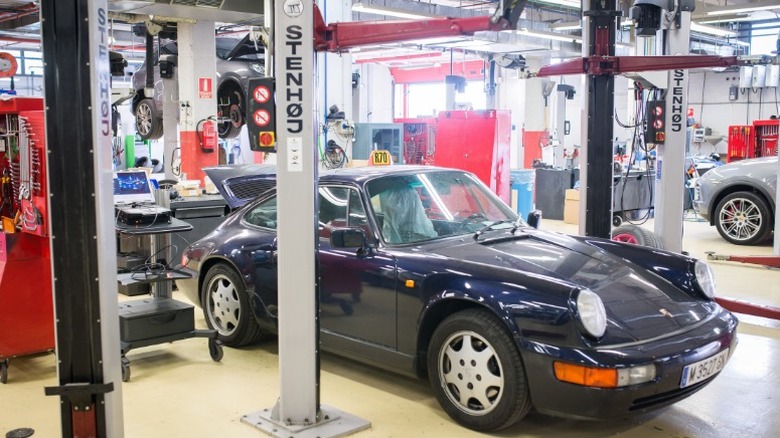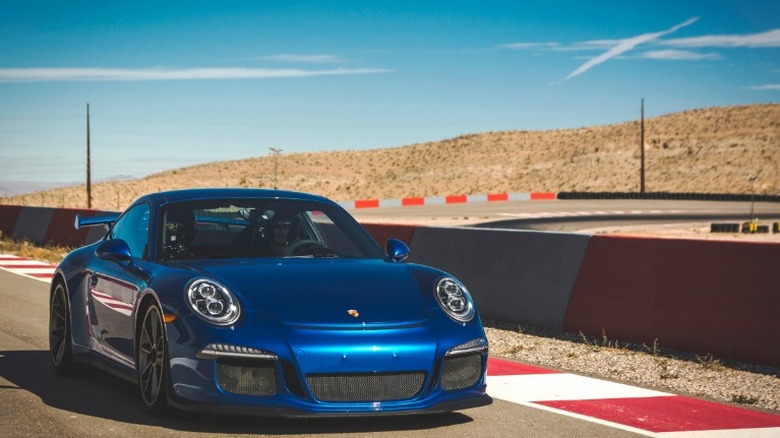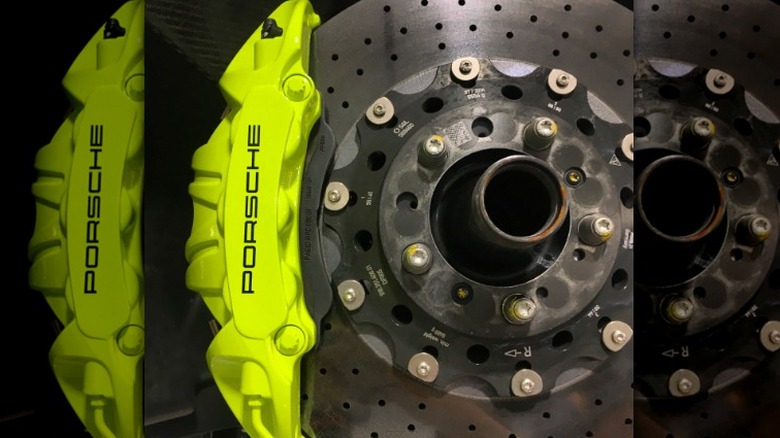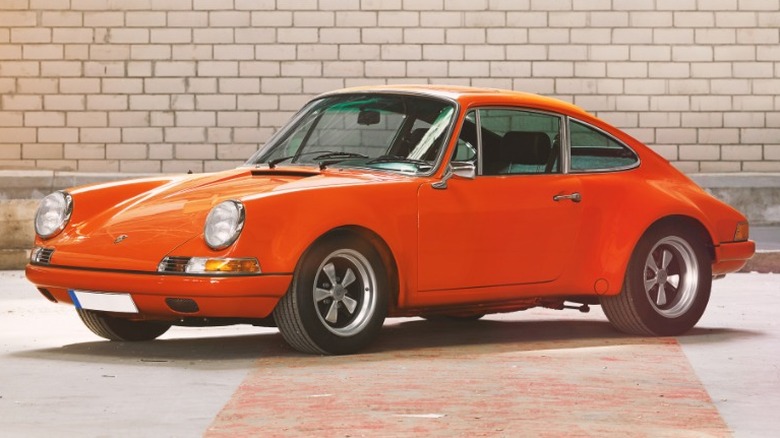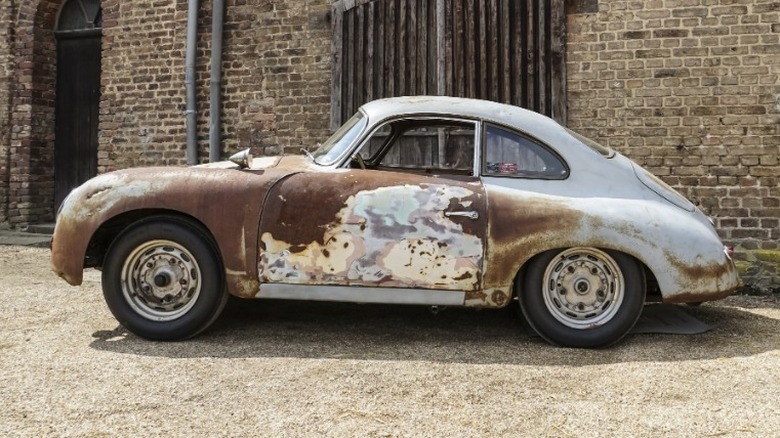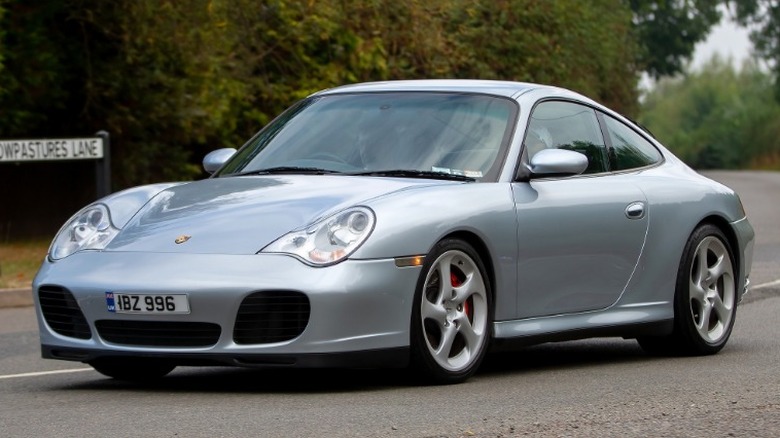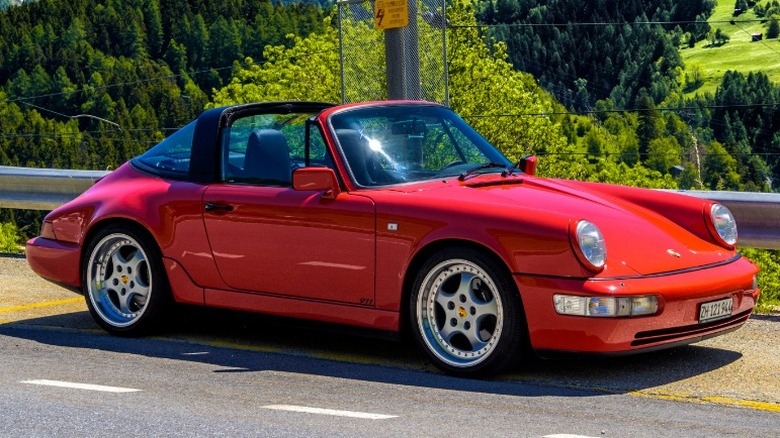10 Things About Porsches You Should Know Before Buying One
Ever since the first hand-built air-cooled sports car rolled out of a workshop converted from a defunct sawmill in Austria, Porsche products have been an object of desire. As the brand expanded production and switched from hand-built cars to serial production using mass manufacturing, its cultural cache grew as well, turning Porsche cars into something beyond mere transportation. Over the years, Porsche has produced some of the most iconic vehicles in the industry and packed in innovation from bumper to bumper. Classics from the 356 Speedster to the technological marvel that is the 959 are coveted prizes worth handsome sums — but there are plenty of other models that are far more attainable.
For many, buying a Porsche is a milestone and a sign of personal accomplishment. For some, it can be a reward for having worked up to a point where it is possible to head to the dealer and buy a brand-new model. For others, it may be a mechanical obsession that results in buying a classic Porsche to restore and personalize a piece of history. Regardless of the reason for buying one of these coveted cars, a bit of forethought should go into any decision.
If you are on the precipice of buying a $200,000 911 Turbo from the showroom or picking up a classic air-cooled model that has seen better days, here are 10 things about Porsches you should know before buying one.
Insurance
Every car needs insurance, but a Porsche has considerations that a buyer wouldn't have to take into account when buying, for example, a new Lexus sedan. Here we focus on insuring a 911, for which there is the most information available, but the information will crossover to other models. Of course, insurance rates vary wildly depending on a few factors, and 911s are much more expensive cars, to begin with. Despite this, the annual cost of insuring new Porsche models is not much more than other high-performance cars that cost less.
Car and Driver reports the annual cost for the 911 as $2,080 while the Camaro runs $1,472, a difference of just $51 per month, despite a price gap of $30,000 or more. When compared to what Nerd Wallet says is the average cost in the U.S. overall, $2,148, Porsche insurance looks downright affordable. While the Porsche is a popular target for thieves, the average age of the owners is 47, so that may contribute to the rates being surprisingly affordable.
For any model more than about 10 years old, you will need to find a classic car insurer. They can write policies that account for the possible scarcity of parts and the need for specialists to do repair work. They can also make independent assessments of value more accurately than a book formula. The cost for these may be more, depending on how you plan to drive the car, and the only way to get a decent estimate is to simply call and find out.
Maintenance
Keeping any car running in top condition requires scheduled maintenance. However, a Porsche needs regular and timely maintenance or it can degrade quickly, especially with older models. This is particularly true of the 911, a precision-engineered high-performance sports car. Further, classic Porsches have regular adjustments and checks pertaining to old mechanical fuel injection systems and ignition components.
Maintaining a new 911 can be quite costly. The average cost of an oil change is around $500 and is recommended every 10,000 miles. Other services are more costly but happen less often. Porsche recommends replacing the PDK transmission oil at 120,000 miles, but the service cost is $1,500 or more. Tires can cost up to $500 for the high-performance options required on some models, and they do not last very long. Softer tires grip better but wear faster. Brake service usually runs $1,000 but can reach $1,800 on some cars. Lastly, service rates at the dealer range from around $150 to $200 or more per hour, so any repair can rapidly become costly.
For classic Porsches, independent shop labor rates may be slightly less than a dealer, but not by much. They will also require the same oil changes and tire replacements but also need a biannual tune-up to the tune of $1,500. Further, the mechanical fuel injection used on all Porsche models from the late '60 to the '80s is a complex system requiring precise adjustments performed by a skilled technician.
Dealership
Buyers in big metro areas will have a dealer nearby. Still, American cities are sprawling places, and a Porsche service center can be miles away from where you live. If you want an older car and have the skills to do your own work or plan to restore something as a project, you will get along fine without regular access to a dealer, except for some occasional parts. However, for new car buyers, a dealer is imperative.
Porsche currently offers a 4-year warranty for up to 50,000 miles, which is generous considering the average warranty is three years and 36,000 miles. Regular service and repairs must be done at the dealer to take advantage of the warranty. In Los Angeles, that is no problem. However, in Jackson Hole, Wyoming, where the average income is more than $300,000, the closest dealer is in Colorado. Even in a place like Texas, where much wealth comes from oil and ranching well outside the metro areas, the closest Porsche dealer can be hours away.
While you might be more likely to find a Porsche owner in Teton County than in West Texas, access to the dealer is a serious consideration for anyone away from the city. Even in a place such as Kansas City, where the metro population exceeds 2 million, there is but one Porsche dealer. Unless you live in the affluent area of Overland Park, service for your new car may be a hassle.
Specialist
A buyer of a new Porsche needs access to the dealer, but Porsche ownership tends to be much longer than most cars at nearly 10 years. Once the warranty period is over, the dealer is not necessary, although many will continue to use its services as they have certified technicians trained by Porsche. Furthermore, used car and classic car buyers also need a qualified shop -– taking your 911 Turbo to Pep Boys would not be advisable.
Most populated areas will have someone who specializes in either Porsche specifically or in high-performance European cars more generally. There will be highly qualified technicians at either kind of shop with expertise and experience working on Porsches. Before your warranty expires or upon purchasing a used model, seek a shop that can service your car right away if you have neither the ability nor the plans to do it yourself.
As with anything, online reviews will be your friend in this endeavor, but you may want to seek out owner clubs in your area and get some personal recommendations. To find an independent shop near you, PCarShops.com is a specialized resource dedicated to finding repair shops for Porsches, and all you need to do is enter your city to get a list of qualified service providers.
Control
Depending on the model of Porsche you might be interested in or capable of purchasing, its engine may be able to produce more than 500 horsepower. Porsches are lightweight vehicles engineered for fast driving, which means the power available goes further toward its acceleration than in heavier cars. However, unique to Porsche is the amount of power created by an engine placed behind the rear wheels, which makes these cars handle differently from any front-engine or mid-engine vehicle around. This means you should know how to control it before taking off down the strip at full speed. News stories and videos abound with people crashing brand-new supercars because owners did not respect the amount of power they had control over.
If you intend to buy a high-powered Porsche and drive it fast, professional training in handling a car at speed is a wise investment. Several driving schools are available and offer sessions from one-day training to an in-depth multi-day program. These programs are meant to teach you how to handle a powerful car on the race track, but that experience will give you the tools to handle your powerful sports car on the street as well.
Car and Driver sends its writers to these schools and lists prices starting for a single-day program for $309 up to $4,000 for an intensive multi-day program, and their writers unequivocally say the expense is worth it. Choices include Skip Barber, Radford Racing School, and — most appropriately for a Porsche buyer — the Porsche Experience Center in Los Angeles.
Parts
New Porsche owners need not worry much about parts, except for any modifications wanted. However, for any used Porsche, whether that is a late model car or a vintage one, sourcing parts will be a necessity. You should already know and expect that prices will be more expensive, as Porsche makes high-performance and luxury cars in much smaller volumes than most. However, modern Porsches benefit from VW's volume manufacturing capability. No matter what you have, finding a fuel pump or mass air flow sensor for your 2015 911 Turbo or an ignition coil for a 1982 Carrera won't be happening at your local O'Reilly's.
Porsche owners tend to relish the experience of driving and are less likely to leave these expensive vehicles on a (metaphorical) pedestal in the garage. As such, things will break from time to time. You will want to find a parts vendor to fulfill your needs and should not have much trouble doing so. Many retailers online specialize in different eras of Porsche or different purposes, such as racing or restoration. For example, Rennline offers a variety of custom accessories and performance parts while AASE Sales provides parts needed to keep vintage Porsches on the road.
Furthermore, Porsche supports its classic vehicles with official parts for cars long out of production, with tens of thousands of parts available. For extremely rare and special vintage models, such as the infamous 959, Porsche even offers the ability to 3D print replacement parts from the original designs.
Reliability
Expensive German cars are commonly thought to be unreliable, but that sentiment rarely comes from those who have actual experience with a Porsche. True owner experiences vary, just as they do for any car, and it is not hard to find someone who swears on the reliability of Porsches in general. The brand gets high marks from consumer guides because Porsche takes quality production very seriously and works hard to ensure their cars are built to the best possible standard. A Vehicle History guide to Porsches of 10 years and older suggests good engine reliability among them with trouble spots on some cars with cooling systems and ignition coil failures.
Some will say a Porsche should be a dependable car. In researching the brand, some doubt can be cast upon this notion. In a recent report from the U.K., at least one website placed Porsche dead last in reliability ratings, and RepairPal currently gives the brand a two out of five rating. However, recent ratings from J.D. Power and Consumer Reports place Porsche among the most reliable vehicles overall. Given that these are established and respected automotive research firms, their ratings should carry some weight.
No matter what anecdotes exist about reliability or what statistics are compiled by a research group, if you maintain your car well and take care of it, it should last. Most importantly, there is nothing like a Porsche, so you should probably forego any of that and get one anyway.
Rust
If you are buying a brand-new or late-model Porsche, this does not apply. Your car should already be perfect or near perfect anyway. However, among the many considerations when buying a vintage Porsche in particular is rust. Older 911s are prone to rust in a few areas, and catching it before buying can save you from getting into a big headache with a considerable cost attached.
Porsche bodies were made of plain steel until 1970 when galvanized steel started being used for the underbody. More parts would be galvanized with future models until the end of the '70s when the entire body shell received the treatment. This means rust is a particular issue for pre-1970 cars, although galvanized steel is not completely immune to rust — it is only rust-resistant. The way Porsche bodies are formed creates crevices that naturally collect water, and while these were the first areas to receive treatment at the factory, you still need to inspect your potential purchase top to bottom.
Rust is a problem for older Porsches and a serious concern for all cars up to 1989, despite galvanizing. Among the spots that need to be checked are sunroof drains and windshield pillars, the trunk floor up front, floorpans in the rear, the battery tray, and just below the windows. Other trouble spots exist, so it is important to be thorough, especially on more dilapidated project cars. A small effort now saves you from huge issues later.
IMS Bearing
Here is something you need to know about a couple of specific Porsche models. Regarding the 996 or 997 model 911, which was built from 1997 until 2013, and the 986 or 987 Boxster and Cayman, which were built from 1996 until 2012, there is a potential part failure that can result in catastrophic engine failure. The intermediate shaft bearing (IMS) is a weak point and much has been written about this lurking danger.
The IMS Bearing is a geared shaft that runs through the engine and is turned by the crankshaft to drive the camshafts of the engine. Therefore, it is a crucial component and something that has been in Porsche boxer engines for decades. This particular problem plagues the first water-cooled engines from Porsche, and the bearing suffers from being made with ball bearings not strong enough to withstand the pressure and inadequate lubrication. In the most extreme cases, bearing failure results in bent valves and cracked pistons, among other damages. Failure has been noted to happen in up to 10% of engines, with some lasting 200,000 miles and some barely making more than 3,000.
This issue means your used Porsche could be a ticking time bomb. Fortunately, a revised bearing is available and a repair can be performed. If you can't get confirmation that this has not been upgraded on a car you buy, plan for it immediately. Skilled Porsche technicians should have experience doing this job and the cost is around $4,000.
Depreciation
Almost any car bought from the dealer is going to experience some degree of depreciation, and a Porsche is no exception, even though it may be different from typical family sedans. As an expensive and well-known high-performance luxury sports car, a Porsche's desirability almost never wanes. Most people are just as eager to drive a 40-year-old Porsche as a brand-new one, which is something not many cars can claim. However, whether you are buying one from the showroom or finding one from a previous era, a Porsche is a significant investment and you should be aware of its potential future value.
Cayennes, Panameras, and Macans will see depreciation typical of most luxury cars, although the 911 sees something different. New Porsche 911 models are seeing only about a 15% drop in value over the first five years of ownership versus 45% for a Panamera. The used car market is in flux, so values across the board are fluctuating, but 911s have been relatively consistent. Right now, models that are about 20 years old have fallen to the lowest levels, which means they can be picked up for around $20,000 or less. However, the values of the slightly older 993 models are skyrocketing, with sales history on Bring a Trailer showing many cars selling for well over $100,000.
All this is to say that if you do buy a Porsche, you should plan to keep it for a very long time — if you weren't already going to do so.
